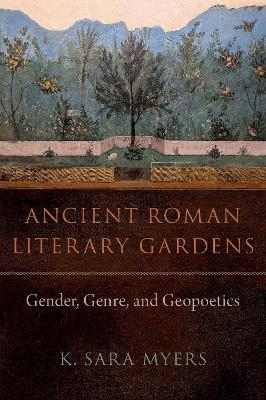
Ancient Roman Literary Gardens
Oxford University Press Inc (Verlag)
978-0-19-777320-8 (ISBN)
While most of the sources in this study are poetic and their gardens fictional, it is still important to situate these works in their cultural and historical contexts. By understanding how to interpret the importance of these spaces in the literature in which they appear, readers will not only better comprehend the aesthetic and ethical values of the work in question, but they will also gain a better insight into ancient Roman attitudes toward gender, art, and human relationships with nature. Myers shows how some Romans constructed the garden as a space under male control: Men are cultivators, while women are cultivated. Literary gardens can symbolize a range of positive masculine ideals and identities for elite men--from the rustic farmer to the philosopher--but can also represent unmanly luxury and leisure. Women in gardens are usually sexualized, depicted as virginal or sexually transgressive, especially when they attempt to express ownership over these spaces. In almost all these texts, the artificial and artistic arrangement of the raw material of nature invites self-reflexivity, which Myers calls "geopoetics," or a "poetics of the earth."
K. Sara Myers is Professor of Classics at the University of Virginia and the author of Ovid's Causes and a commentary on Ovid's Metamorphoses 14.
Introduction: Gardens, Gender, Genre, Geopoetics
Chapter 1: Masculine Horticultural Self-Fashioning: Hard and Soft Labor
Chapter 2: Vergil's Garden (Georgics 4.116-48): A Literary Paradigm
Chapter 3: Women in the Garden: Catullus, Ovid, and the Greek Poetic Tradition
Chapter 4: Trampling in the Garden: Satiric Verse and Epigram
Chapter 5: Columella and the Poetics of Horticulture
Conclusion and Epilogue
| Erscheinungsdatum | 04.08.2024 |
|---|---|
| Verlagsort | New York |
| Sprache | englisch |
| Maße | 164 x 237 mm |
| Gewicht | 599 g |
| Themenwelt | Literatur ► Klassiker / Moderne Klassiker |
| Sachbuch/Ratgeber ► Natur / Technik ► Natur / Ökologie | |
| Geschichte ► Allgemeine Geschichte ► Vor- und Frühgeschichte | |
| Geisteswissenschaften ► Sprach- / Literaturwissenschaft ► Anglistik / Amerikanistik | |
| Geisteswissenschaften ► Sprach- / Literaturwissenschaft ► Literaturwissenschaft | |
| ISBN-10 | 0-19-777320-6 / 0197773206 |
| ISBN-13 | 978-0-19-777320-8 / 9780197773208 |
| Zustand | Neuware |
| Informationen gemäß Produktsicherheitsverordnung (GPSR) | |
| Haben Sie eine Frage zum Produkt? |
aus dem Bereich


